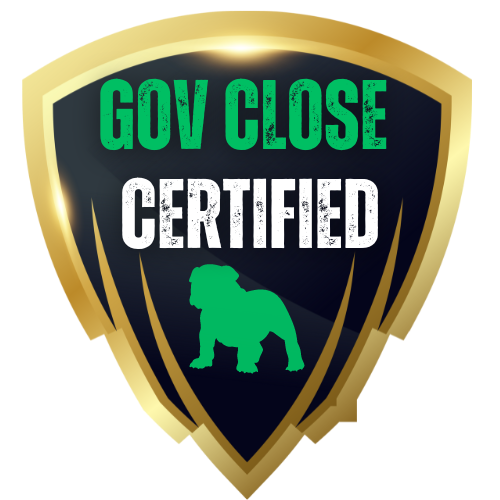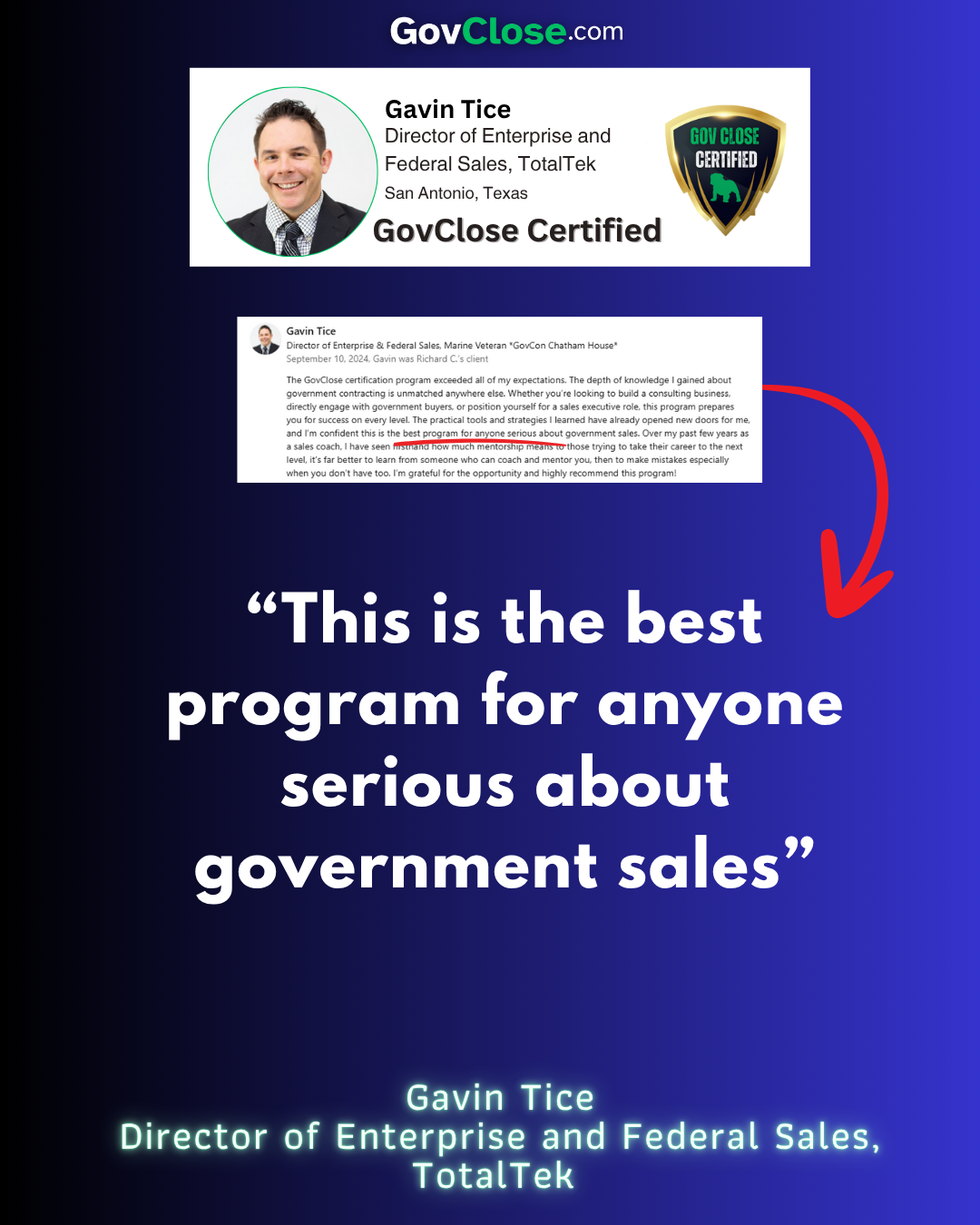
Evaluate Your Sales Chain (Podcast Transcript)
Oct 10, 2022[01:22] Richard C. Howard: Hey, guys, Ricky here with DOD Contract Academy. Thanks for tuning in. This week we're going to talk about something very important, which is evaluating your sales chain for federal sales, for your defense sales that you're selling to the US military Department of Defense. And the reason we do this is to optimize and improve what we're doing as far as the bottom line is concerned, and that's winning contracts with the US government. There's a lot of pieces involved with selling to the government, but I'm picking some of the big stumbling blocks that people have, and we're looking through each one, each link in the chain, because each one is very they all serve their own purpose. Each link is very important and if one is broken or not working the way that it should, then you're either not going to win contracts with the government or when, very few or none. So we want to take a look at each of those, and we'll walk through a little bit of how you can evaluate each link in the chain and make sure that what you're doing makes sense, see if we can improve it, see if we can do better. So first link in the chain is to ensure that you have a target customer within the DOD, within one of the federal agencies. And I don't mean just picking a federal agency. I mean you should know the exact offices that buy what you sell within the agency that you're targeting. So we're a DOD contract academy, so we're going to focus on military. So I should know that there is an office within the air force in air Force material command in the Lifecycle Management Center. Maybe there's three offices there that buy the product that I'm selling. If you're selling HVAC units, it might be a civil engineering shop within the army or an Army Corps of Civil Engineering acquisition shop within the army that's buying what you sell. But you can find all that information very easily.
[03:21] Richard C. Howard: So if you have a customer, you should know who you're targeting, know what you're selling, how much the government is buying, how they make those purchases. So it should go without saying, but it doesn't. So that's the first step. If you don't know that, then you're probably not doing as well as you could be in your federal sales. Next is finding opportunities ahead of solicitation. So you shouldn't be just writing proposals on solicitations as they come out. You should know about those opportunities as far ahead of time as you can with your target customer. So three months, six months, a year out, you should know these opportunities are coming in and this should be a continual thing. You should have a process for identifying opportunities ahead of the solicitation. Now if you do not, then that's something that you can develop. Or if you're only finding, hey Rick, we're really not sure how to do that. Well, there are several ways you can do that. One of them is RFI and sources sought. You can find out about those opportunities through conversations.
[04:20] Richard C. Howard: There's several ways. If your sales team is not doing that, you can get them trained, maybe find somebody that has a better understanding of the federal sales process. But they need to be finding opportunities ahead, ahead of solicitation. Okay, then regular meetings. Are you having regular meetings with your target customer? So it's extremely important and there's a lot of ways to do that. But you can look and see, hey, am I having weekly or monthly meetings with the clients that I have and with target customers within my agency office that I'm trying to sell to? There are a lot of ways to get those meetings. Again, if you find that that is a problem area, hey, we're not getting those meetings, or hey, we reach out but they don't respond to us, you can go to our website and get a little bit more on that. Try looking at some of the other podcasts because it could be something as simple as, look, people in the government routinely I would get emails from my wife when I was in the Air Force that wouldn't come through the system because she had links in there or there's lots of reasons an email might not go through. So there's actually several ways to reach your target customer, your program manager, contracting officer, whoever you're trying to talk to, but you got to make sure that you're aware of those and that you're doing those. And that's going to increase the amount of meetings that you have, just ensuring that you're reaching out and you're trying to provide value, right? You're not just pitching them, you know that they have a problem they're trying to solve and you can solve that problem.
[05:46] Richard C. Howard: That's something you should know before you make that phone call. Are you regularly submitting sources sought RFI responses or white paper responses to things like SBIRS or OTAs or other things like that? If it makes sense for your business RFI and sources, so it should be something that is a routine occurrence for your business. So if you're not submitting those, then that's something you can go back and take a look at. Because look, that's an easy way of influencing opportunities. That's the government saying, hey, I have an opportunity that is most likely funded and there's a requirement for it. And we're just trying to figure out. How we're going to either buy it or maybe we need some more details on the project that we're trying to complete. And you're the subject matter expert. You can influence that. You can advise them on how the upcoming solicitation should come out. Sometimes that could turn into a meeting for you. I often request a meeting after I submit an RFI or source of salt response and it could influence the requirements in a solicitation, so you are more likely to win. Are you regularly attending conferences? Going to conferences and having a booth at a conference for a business trying to sell to the government is like throwing gas on the fire.
[07:11] Richard C. Howard: You speed up everything dramatically when you find the right conference because you could have the user of what you have, you could have the acquisitions professional, they can actually buy from you and you could have requirement generators. So senior leaders that actually set aside funding and decide what the requirements are going to be, a lot of times the right conference will have all three of those people and that can expedite what you're trying to do dramatically. I would pick two or three a year and you can look at some of our other podcasts, go to our training to see what our recommendations is for picking the conference, how you actually are going to approach the conference, attending the conference, what are some best practices, formal engagement on proposals. So once you go through all this work of influencing, you actually have to put a proposal together and submit it. So make sure you're tracking that and make sure you know what you're doing. Or you have somebody that's a proposal writer on your team that is meeting the specifications that the Contracting Officer is putting out. It's very important. This is not a subjective artistic approach where you can feel free to put as many pages as you want into a proposal and write whatever you want. It's a very exact science and if you don't include something that the Contracting Officer wants in there, they could just dismiss your proposal altogether or these proposals are scored very accurately and if you miss something.
There could be points set aside for different sections, and if you're missing the details, you could be losing points and losing the win in the end. So you don't want to do that. Make sure that you are running those proposals correctly and you want to make sure you're winning, right? So if you're not winning the proposal now you got to go back to that chain we just talked about. Which link in that chain is broken? If you're not winning the proposal, if your product is perfect, if your solution is perfect for what the government is asking for, what happened, it could be that the proposal was the proposal dismissed. You can ask for a review by the contracting officer after. Usually you won't get it until after the award, but they can tell you, hey, you know, this is how you scored, or, hey, this is what was missing, this is what could have been done better. You want to know what your proposal written correctly to begin with, because that could be the only thing that's wrong. But provided the proposal was written correctly and your pricing was right and your solution is right, then it's probably something else. Did you influence that opportunity? If you just wrote a proposal? It doesn't matter if your product or solution is perfect. If the first time they're hearing from you is when you submitted, then you're probably not going to win. So don't get mad at them. Get mad at yourself. You should have known about that six months ahead of time and been influencing the hallway. So if you hadn't, then you know, hey, you have some work to do. But if you were, which link in the chain is broken? What could you have done a little bit better? Did you set up meetings? Did you submit an arrow, fire, source of thought if there was one? Did you find it ahead of time? How much timeline did you have before the solicitation came out to actually develop that relationship and influence accordingly? Did you have teaming set up? Did you need a teaming or a partner? What contract vehicles are being used to set up or to actually make the purchase for the government for that particular solicitation? There's a lot that goes into that.
[09:28] Richard C. Howard: Take a look at the chain. There's probably some improvement you could have done there to improve your odds in the way you're not going to win all of them, but this is going to ensure that you have your best opportunity, your best foot forward. So hopefully that makes sense and you've got some value out of this. Head over to Dodcontract.com. You can check out our Dodcontract academy, we have a monthly membership. We have some great training, tons of training, and it's step by step, and it's very clear to take you from registering your business all the way to closing, consistently closing contracts. We have weekly coaching. We're helping our students close those opportunities and win contracts. And they're winning and they're doing great. And I'd love to have you in there so you could do the same.
If you enjoyed this episode, you can also check out Shots on Goal where I talked about the importance of engaging officially on government opportunities, about how important it is to influence and have conversations and ensure your research is correct. Because at the end of the day you have to take shots on goal if you want to score!
Turn Government Contracting Knowledge Into Income
This isn’t a course. It’s a certification and implementation system to help you build a consulting business, land a high-paying sales role, or scale your own company in federal contracting.
We hate SPAM. We will never sell your information, for any reason.


